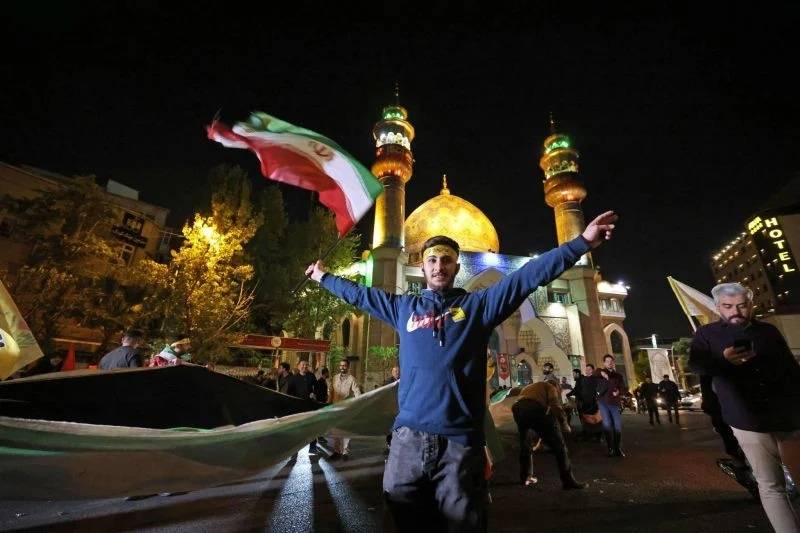
Iranian protesters wave a Palestinian flag as they gather at Palestine Square in Tehran on April 14, 2024, after Iran launched a drone and missile attack on Israel. (Credit: Atta Kenare/AFP)
"The evil regime will be punished," Iran's Supreme Leader Ayatollah Ali Khamenei republished on his X account in the minutes following the start of his regime's "True Promise" operation against Israel late Saturday evening. The attack, which follows an Israeli strike on an Iranian consular building in Damascus, is the first direct attack ever carried out by the Islamic Republic against Israeli territory.
L'Orient-Le Jour takes stock of all you need to know about this unprecedented attack this morning:
“True Promise”
Shortly before midnight Beirut time, Iran launched a drone and missile attack from its territory towards Israel. The Israeli army counted "more than 300" missiles and drones, while the Iranian public press agency described sending "a first wave of ballistic missiles against Israel." Hezbollah and Yemen's Houthis simultaneously carried out anti-Israeli attacks, the former by firing rockets into the Golan occupied by Israel and the latter by launching drones towards Israeli territory.
According to the official Iranian agency IRNA, the attack caused "serious damage in the most important air base in the Negev," in the south of Israel, while the Israeli army assured in the middle of the night that it had "intercepted the vast majority of missiles" and that only "minor damage" had been caused to a military base. Israel has so far reported two civilian injuries on its territory.
"The matter can be deemed concluded," the Permanent Mission of the Islamic Republic of Iran to the United Nations wrote on X. "However, should the Israeli regime make another mistake, Iran’s response will be considerably more severe. It is a conflict between Iran and the rogue Israeli regime, from which the U.S. MUST STAY AWAY!," it added.
A senior Israeli official said there will be a "significant response," according to Reuters, citing an Israeli channel. “Israel has repelled the first major wave of Iranian drone and missile fire, but the confrontation is not yet over,” Israeli Defense Minister Yoav Gallant said at dawn on Sunday. Meanwhile, Prime Minister Benjamin Netanyahu published this message on X: “We intercepted, we pushed back, together we will win.”
The Iranian attack "pushes the region towards escalation," the Israeli army said, specifying that its armed forces are "fully operational" and that discussions are underway to determine "the continuation of operations."
As a precautionary measure, Jordan, Iraq and Lebanon temporarily closed their airspaces overnight. Detonations were also heard in the skies of Beirut and the Bekaa, according to witnesses, and above Damascus, Homs and Hama in Syria. The Jordanian air force announced that it had shot down dozens of Iranian drones which crossed its airspace towards Israel, like American and British combat planes which shot down some above a border area between Iraq and Syria, according to the Israeli army.
Security Council meeting Sunday afternoon
While Netanyahu and his staff met in a bunkered room, the White House indicated that it was "in constant communication with Israeli officials as well as other partners and allies." The White House also reaffirmed that its “support” for Israel’s “security” was “unwavering.”
At dawn, US President Joe Biden and Netanyahu spoke on the phone. Biden also said that he would convene on Sunday his counterparts from the G7, a group of the most industrialized countries, in order to coordinate a “united diplomatic response” to the “brazen” attack on Tehran.
The Pentagon claimed to have intercepted “dozens of missiles and drones” coming from Iran, Iraq, Syria and Yemen. US Defense Secretary Lloyd Austin called for “de-escalation.” Stressing that the United States is not seeking conflict with Iran, he nevertheless clarified that his government “would not hesitate to act to protect American forces [in the region] and to support Israel in defending itself.”
The European Union for its part "strongly" condemned this attack, deeming it "unacceptable" and constituting "an unprecedented escalation and a serious threat to regional security," the EU's top diplomat Josep Borell wrote on X.
UN chief Antonio Guterres also condemned this "serious escalation."
A meeting of the UN Security Council is scheduled to take place on Sunday in New York at 4 p.m. (11 p.m. Beirut time), a spokesperson for the Maltese diplomatic mission, which holds the presidency of the Council in April, said.
Saudi Arabia, for its part, called on all parties to demonstrate the "highest level" of restraint and to spare the region and its inhabitants the dangers of war. Egypt affirmed through its Foreign Ministry that it is “in direct contact with all parties to the conflict to try to contain the situation,” while warning against the “risk of regional expansion of the conflict.”
This article was originally published by L'Orient-Le Jour in French.